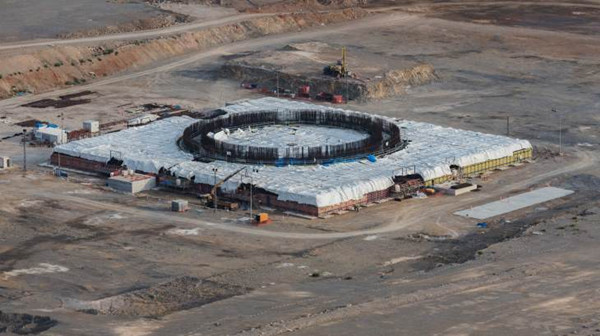Russian state nuclear corporation Rosatom has announced completion of the basemat for the nuclear island buildings of unit 1 of the Akkuyu nuclear power plant in Turkey. Meanwhile the European Parliament has voted to suspend European Union accession negotiations with Turkey and has reportedly called for cancellation of the Akkuyu project.

The Akkuyu nuclear power plant construction site (Image: Rosatom)
The project is based on an inter-governmental agreement signed between Russia and Turkey in May 2010. In April 2018, Russian President Vladimir Putin and Turkish President Tayyip Erdogan attended a ceremony to mark the pouring of first safety-related concrete for unit 1.
The project is being managed by Russian-owned JSC Akkuyu Nuklear. Its CEO, Anastasia Zoteeva, said that the concreting work had met the requirements and safety standards of the International Atomic Energy Agency.
The milestone was completed on 8 March and involved the casting of 17,000 cubic meters of self-compacting concrete, Rosatom said. Construction of exterior and interior walls of the reactor building will be the next stage, while building concrete bases for the auxiliary reactor building and the emergency control room building are simultaneously under way, it added.
JSC Akkuyu Nuklear obtained a limited work permit for unit 2 of the Akkuyu plant in November last year, according to which the engineering studies for the working documentation stage are already in progress. This will enable work on all of the unit's facilities except those related to the safety of the nuclear island. The company expects to receive the main construction licence for unit 2 this year when it will be able to proceed with the pouring of concrete for its basemat. To date, 70% of the site is ready for construction work to begin, with the remaining 30% prepared by the end of the year, it said.
In parallel with activities on the construction site, the package of documents for Turkish regulator TAEK is being prepared for the company's application for a construction licence for unit 3.
The four-unit, 4800 MWe plant is part of Erdogan's '2023 Vision' marking 100 years since the founding of modern Turkey and is intended to reduce the country's dependence on energy imports. The first unit is scheduled to start operations that year, with the other three units following by 2025. The plant is expected to meet about 10% of Turkey's electricity needs.
European Parliament vote
The European Parliament has announced it wants to suspend EU accession negotiations with Turkey because it "remains seriously concerned" about Turkey's track record in upholding human rights, the rule of law, media freedom and the fight against corruption, "as well as its all-powerful presidential system". Members of the European Parliament (MEPs) adopted the corresponding resolution yesterday by 370 votes in favour, 109 against and with 143 abstentions.
The EU is Turkey's largest trading partner, while two-thirds of foreign direct investment in Turkey comes from EU member states. Negotiations on its EU accession started in 2005.
Although the European Parliament did not mention the Akkuyu project in its statement on yesterday's resolution, various media have reported that MEPs had called on Turkey to halt constructing a nuclear power plant.
TRT World, a Turkish news channel, reported that, prior to discussing the nuclear reactor the European Parliament's Committee on Foreign Affairs had prepared a report, in which Turkey was accused of acting against the Convention on Environmental Impact Assessment in a Transboundary Context. The Espoo Convention, as it is known, is a United Nations Economic Commission for Europe convention signed in Espoo, Finland, in 1991 that entered into force in 1997. Turkey has not ratified the convention.